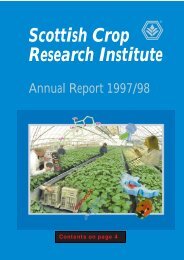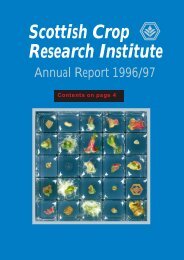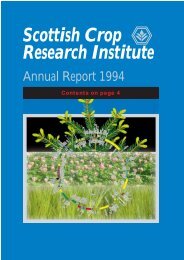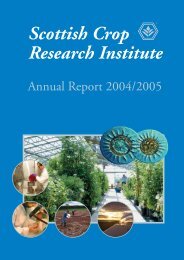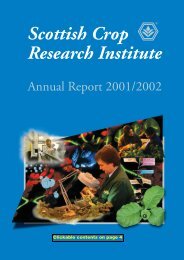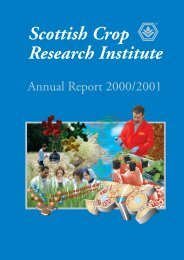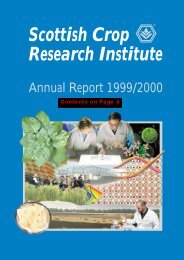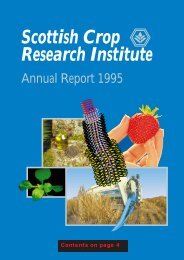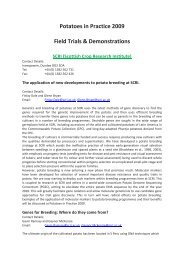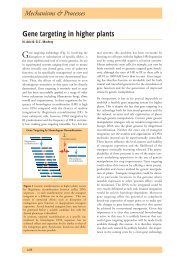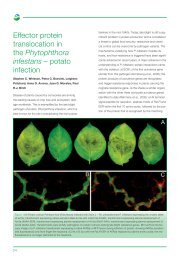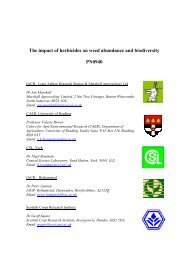PDF file: Annual Report 2002/2003 - Scottish Crop Research Institute
PDF file: Annual Report 2002/2003 - Scottish Crop Research Institute
PDF file: Annual Report 2002/2003 - Scottish Crop Research Institute
You also want an ePaper? Increase the reach of your titles
YUMPU automatically turns print PDFs into web optimized ePapers that Google loves.
Environment<br />
The Theme has also been gearing up for major trans-<br />
EU activity in 2004 and beyond. Staff coordinate two<br />
EU funded projects on the late blight, Phytophthora<br />
infestans, one of the most pernicious pests in world<br />
agriculture. EUCABLIGHT draws together all<br />
European work on the integrated control of late<br />
blight; the aim is to reduce the inputs of fungicide by<br />
introducing durable blight resistance more widely<br />
among commercial potato cultivars. ECOPAPA aims<br />
to incorporate durable resistance to late blight into<br />
germplasm of the breeding programmes of participating<br />
countries, and notably extends operations beyond<br />
the EU to Bolivia, Argentina, Uruguay and other<br />
parts of Latin America. ECOGEN – the study of ecological<br />
and economic impacts of GM crops – is an 8-<br />
partner project which examines the integration of GM<br />
and conventional varieties in cropping systems, and<br />
particularly the effect of GMOs on soil ecology. And<br />
most recently, SIGMEA, a >40-partner EU project in<br />
which SCRI will manage a major workpackage, aims<br />
to draw together all European research on gene flow<br />
and persistence in oilseed rape, beet, maize and other<br />
crops, then to construct workable predictive models of<br />
GM coexistence. This increased networking by<br />
Theme 3 in Europe – we now liaise with over 100<br />
groups through these EU projects – enables our science<br />
to influence, and be influenced by, researchers in<br />
other environments and production systems. We are<br />
demonstrating through this work that basic science<br />
can be scaled from plant to region to provide sound<br />
recommendations that influence the policy of the EU<br />
and the care of its managed ecosystems.<br />
Outreach and education Towards the end of <strong>2003</strong>,<br />
the Theme formed a Systems <strong>Research</strong> Group to expand<br />
and exploit its expertise in ecological and environmental<br />
research. The Group will apply knowledge of soils,<br />
plants, microbes and invertebrates to resolving problems<br />
in crop ecology and crop production. Its remit is<br />
the ‘lowland’ or arable production systems of northern<br />
Europe, dominated by barley and wheat, and including<br />
potato, legumes, brassica crops and soft fruit. The<br />
Group will provide a systems context for SCRI’s<br />
Product Innovation Centre for potato, barley and soft<br />
fruit. High in its remit is to ensure that SCRI’s activities<br />
in systems research are fully integrated with complementary<br />
studies at related organisations,<br />
particularly the Macaulay <strong>Institute</strong>, SAC and SNH.<br />
The first tasks of the Group will combine and apply<br />
existing knowledge in four specific, linked subjects -<br />
sustaining crop production while enhancing arable<br />
food webs, coexistence between conventional, organic<br />
and GM cropping , whole-system carbon balance and<br />
the recycling of carbon ‘wastes’, and local impacts on<br />
regional processes in epidemiology. The hub of the<br />
Group’s work is modelling the cropped ecosystem,<br />
based on the conceptual and biometrical approaches<br />
that were the basis of the MAPP, the Management<br />
Advisory Package for Potato. Several generic elements<br />
of MAPP will form the basis of a flexible framework,<br />
notably active influence diagrams that are used in<br />
design, development and documentation and a rulebased<br />
broker-agent model for flexible, context-specific<br />
querying. The Systems <strong>Research</strong> Group is forming links<br />
with end-users specialising in plant breeding, farmland<br />
wildlife, agronomy, crop protection and land use<br />
policy. Together we shall develop a flexible and complementary<br />
network of research and advisory functions<br />
to tackle emerging environmental issues.<br />
An important part of the Theme’s outreach is the<br />
Living Field Project, which transfers ecological and<br />
crop science to schools and the lay public. We have<br />
concentrated this year on material aligned with<br />
schools’ requirements and completed three stages that<br />
cover ages 5-11 (A to D/E) of the science curriculum.<br />
Staff from the Theme have been much involved in the<br />
conception and execution of this resource along with<br />
members of SCRI’s Scientific Liaison and<br />
Information Service (SLIS) and a Primary School<br />
teacher who has worked closely with staff to ensure<br />
that the CD is relevant, easy to use and fun for pupils.<br />
All three stages are being discussed with national and<br />
regional education offices and trialled in various<br />
schools before launch through digital (web, CD)<br />
media by mid-2004. The Living Field Project is also<br />
being extended to a community garden in the SCRI<br />
farm, which also will be ready for visits in 2004<br />
(organised through SLIS); and will be extended to<br />
cover the full secondary curriculum.<br />
None of these developments in science, outreach and<br />
education would have occurred without the Theme’s<br />
integrative philosophy that combines disciplines and<br />
methodologies linking science to tangible applications<br />
at scales of the organism and the landscape. Our<br />
approach to GM plants in the environment, for example,<br />
combines genetics, whole-plant physiology, community<br />
dynamics, molecular diagnostics, seedbanks,<br />
entomology, soil-plant relations, modelling and statistics<br />
– all of which are in-house and which together<br />
inform issues of scientific, public and economic significance.<br />
Finally, the turnover of staff through retirements,<br />
notably in Host-Parasite Co-evolution,<br />
provides an opportunity to concentrate and strengthen<br />
our science in areas of epidemiology and disease<br />
resistance in crops and other vegetation. A challenging<br />
year ahead.<br />
118



